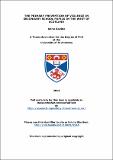Files in this item
The primary prevention of violence in secondary school pupils in the West of Scotland
Item metadata
| dc.contributor.advisor | Williams, Damien John | |
| dc.contributor.advisor | Donnelly, Peter D. | |
| dc.contributor.author | Gavine, Anna Jane | |
| dc.coverage.spatial | 538 | en_US |
| dc.date.accessioned | 2015-04-22T15:52:26Z | |
| dc.date.available | 2015-04-22T15:52:26Z | |
| dc.date.issued | 2014-06-27 | |
| dc.identifier | uk.bl.ethos.644818 | |
| dc.identifier.uri | https://hdl.handle.net/10023/6544 | |
| dc.description.abstract | Violence is a leading cause of morbidity and mortality amongst young people. Public health approaches are now being increasingly utilised to reduce the risk of young peoples’ involvement in violence. One such programme is Medics Against Violence (MAV), which aims to reduce pro-violent attitudes and enhance empathy in secondary school pupils. This thesis aims to investigate whether this approach can be effective in tackling youth violence in secondary school pupils. A mixed-methods approach was adopted to conduct both an outcome and process evaluation of MAV. Four schools took part in the outcome evaluation, which examined whether there was a change in attitudes towards violence or empathy in pupils receiving the MAV programme. The process evaluation consisted of focus groups with school pupils, and open-ended questionnaires and semi-structured interviews with MAV volunteers. There was a small but significant reduction in pro-violent attitudes immediately post-intervention. However, this was not sustained at three months and there was no significant increase in empathy scores. Pupils generally demonstrated anti-violent attitudes, although were more likely to support the use of reactive violence. The pupils appeared to enjoy and generally engage well with the programme. In particular, the use of real footage, interviews with those affected by violence and the Glasgow setting provided a sense of realism for the pupils. Moreover, pupils valued the opportunity to discuss the issues raised by MAV with the volunteers. Volunteers felt engagement was occasionally an issue in the most affluent areas. However, some volunteers adapted the programme to focus on victimisation prevention in the most affluent schools. Further development is therefore needed in terms of establishing who the programme is aimed at (i.e. potential victims or perpetrators), focusing on reactive violence and increasing the sustainability of its effects. | en_US |
| dc.language.iso | en | en_US |
| dc.publisher | University of St Andrews | |
| dc.subject | Public health | en_US |
| dc.subject | Violence | en_US |
| dc.subject | Primary prevention | en_US |
| dc.subject | Universal school-based prevention programme | en_US |
| dc.subject | Mixed-methods evaluation | en_US |
| dc.subject.lcc | HQ799.2V56G2 | |
| dc.subject.lcsh | Violence--Prevention--Scotland | en_US |
| dc.subject.lcsh | Youth and violence--Scotland | en_US |
| dc.subject.lcsh | Children and violence--Scotland | en_US |
| dc.title | The primary prevention of violence in secondary school pupils in the West of Scotland | en_US |
| dc.type | Thesis | en_US |
| dc.contributor.sponsor | Strathclyde Joint Police Board | en_US |
| dc.type.qualificationlevel | Doctoral | en_US |
| dc.type.qualificationname | PhD Doctor of Philosophy | en_US |
| dc.publisher.institution | The University of St Andrews | en_US |
This item appears in the following Collection(s)
Items in the St Andrews Research Repository are protected by copyright, with all rights reserved, unless otherwise indicated.

